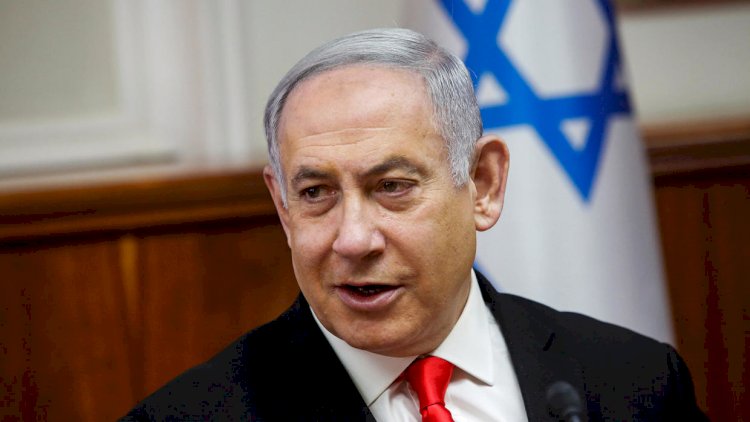Israel election: Netanyahu claims 'biggest win' amid vote count
Israel's longest-serving prime minister, Mr Netanyahu, 70, is seeking a record fifth term, having been in office from 1996 to 1999 and again from 2009.

Prime Minister Benjamin Netanyahu has claimed victory in Israel's general election, with partial results putting him ahead of main rival Benny Gantz.
Exit polls suggest his right-wing bloc is on course to win 59 seats to become the biggest group but will still be short of a majority by two seats.
Nevertheless, Mr Netanyahu declared the outcome "the biggest win of my life".
Monday's election was Israel's third in less than a year, after neither leader was able to form a government.
With 90% of votes counted, Mr Netanyahu's Likud party has won 29.3%, compared to 26.3% for Mr Gantz's centrist Blue and White party.
Israel's longest-serving prime minister, Mr Netanyahu, 70, is seeking a record fifth term, having been in office from 1996 to 1999 and again from 2009.
The election took place two weeks before Mr Netanyahu is due in court to face corruption charges, which he denies.
How close is the race?
Initial projections after voting ended forecast 60 seats for the right-wing bloc, but this was later revised down to 59.
The opposition centre and centre-left parties are on course to win 54-55 seats, according to the exit polls.
The Joint List alliance, representing Israel's large Arab minority, is projected to get 14 or 15 seats.
Final results are not due out until Tuesday afternoon at the earliest. But with most of the votes counted Benjamin Netanyahu's Likud is the largest party.
The opposition Blue and White alliance failed to weaponise his upcoming trial on corruption charges.
Likud and its right-wing allies need to muster 61 parliamentary seats for Mr Netanyahu to form a majority government.
Projections suggest his right-wing bloc will need defections from other parties - quite possible in Israel's fluid party system - to pass the all-important threshold.
But Mr Netanyahu will take a majority of one as a mandate for his agenda.
That includes the annexation of parts of the occupied West Bank that Palestinians want for a future state, as laid out in Donald Trump's so-called "deal of the century".
Mr Netanyahu hailed a "huge victory". But the results show that Israel remains deeply divided about the future and his controversial, populist leadership.
Despite the shortfall, Mr Netanyahu promised to build "a strong national government".
"We must avoid any more elections. It's time to heal the rifts. It's time for reconciliation," he told supporters in Tel Aviv.
READ ALSO:
Airstrike in northern Syria kills more than two dozen Turkish soldiers
How have opponents reacted?
Benny Gantz did not immediately admit defeat, but accepted that the exit polls did not appear promising.
"I realise and share your feelings of disappointment and pain, for this isn't the result that we wanted to happen," he said.
Israel, he added, "needs unity, it needs conciliation, it yearns for a leadership that unites, and that is something that we will continue to offer the Israeli public".
Yisrael Beiteinu leader Avigdor Lieberman, who was in the position of kingmaker after the last two elections, said it would keep its campaign promise not to join a coalition with religious parties.
"We are a party with an orderly worldview, with principles," he said.
In the coming days, President Reuven Rivlin will officially hand a mandate to form a government to the party which stands the best chance.
What could this mean for Palestinians?
The secretary general of the Palestine Liberation Organisation (PLO), Saeb Erekat, tweeted after the exit polls were published that it was "obvious that settlement, occupation and apartheid have won the Israeli elections".
During the campaign, Mr Netanyahu vowed to swiftly annex Jewish settlements and the Jordan Valley in the occupied West Bank if he won a fifth term.
Such a move was made more possible after US President Donald Trump released his Middle East peace plan in January. Mr Trump said the US would "recognise Israeli sovereignty over the territory that my vision provides to be part of the State of Israel", including parts of the West Bank - a departure from past US positions.
The Palestinians, who have rejected Mr Trump's plan as one-sided, insist that all the settlements must be removed if there is to be final peace deal.
More than 600,000 Jews live in about 140 settlements built since Israel's 1967 occupation of the West Bank and East Jerusalem. The settlements are considered illegal under international law, though Israel disputes this. The US has also declared it no longer sees the settlements as illegal.
What about Mr Netanyahu's trial?
A wily political operator, Mr Netanyahu is known to his supporters as "the magician" for his ability to defy sceptics.
He fought this election under the cloud of criminal proceedings, as he is due in court on 17 March to face charges of bribery, fraud and breach of trust in connection with three separate cases.
He is alleged to have accepted gifts from wealthy businessmen and dispensed favours to try to get more positive press coverage.
Mr Netanyahu has strongly denied any wrongdoing, saying he is the victim of a politically motivated "witch hunt".
Even if convicted, Mr Netanyahu would not be required to step down as prime minister until the appeals process was exhausted.




































